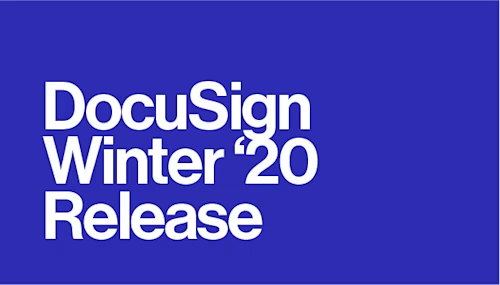
¡Docusign presenta el Winter Release 2020!
Docusign ha anunciado su Winter Release 2020 con diversas nuevos productos que se integran con Salesforce para negociar y gestionar contratos.


Recientemente, presentamos novedades impactantes en el Dreamforce ‘19. Estamos muy orgullosos de ser un socio innovador y compartir la magia de Docusign con miles de personas.
Por esto, estamos muy entusiasmados de presentar el nuevo Docusign Agreement Cloud para Salesforce, destacando dos nuevos productos nuevos en este Winter Release 2020: Docusign CLM y Docusign Negotiate.
Estas innovaciones facilitan más que nunca que nuestros clientes preparen, firmen, ejecuten y gestiones sus acuerdos.
Ve la presentación del Winter Release por Ron Hirson, el Chief Product Officer de Docusign:
[embed]https://docusign.wistia.com/medias/b7yym5vazu\[/embed\]
Conoce Docusign CLM
Los clientes conocen y adoran Docusign por digitalizar el proceso de firma. Todavía, hay varios pasos en el ciclo de vida del contrato, antes y después de la firma, que se basan en procesos apartados y manuales.
De hecho, de acuerdo con la encuesta de Docusign sobre El estado de la gestión de contratos (en inglés), un tercio de las empresas aún utilizan Excel para gestionar sus acuerdos.
El uso de múltiples hojas de cálculo y el largo intercambio de mensajes por correo electrónico son fuentes de costos y riesgos innecesarios, desperdicio de tiempo e insatisfacción de clientes y empleados.
El Docusign CLM es la nueva generación de nuestro CLM (Contract Lifecycle Management), conocido anteriormente como SpringCM.
Junto con Docusign eSignature, Docusign CLM digitaliza completamente el ciclo de vida de tus contratos al automatizar su creación, negociación, ejecución y almacenamiento.
Docusign CLM incluye:
Un mecanismo de flujos de trabajo flexible que permite a los usuarios automatizar incluso los procesos de acuerdo más complejos, reduciendo el retrabajo y errores;
Un repositorio central donde puedes almacenar y buscar todos tus contratos. Puedes inclusoincluso crear un flujo para metadatos (es decir, tags/etiquetas, fecha de firma, tipo de contrato), para recordatorios de renovaciones, por ejemplo.
Generación automatizada de documentos, buscando los datos de tus sistemas, como el CRM. Comparado con los procesos manuales de creación de acuerdos, cortando y pegando datos de otros sistemas, la generación automatizada ahorra tiempo y elimina errores.
Soporte automatizado para tareas de negociación, incluso revisiones, aprobaciones, control de cambios y versiones.
Todo esto incluye la seguridad y la conformidad líderes en su categoría: SOC 2, HIPPA y la autorización FedRAMP.
Conoce Docusign Negotiate
Para las pequeñas y medianas empresas (PyMEs) que aún no necesitan el amplio alcance de las características de Docusign CLM, todavía necesitan automatizar la creación y negociación de sus acuerdos, presentamos Docusign Negotiate.
El producto incluye versiones optimizadas de las capacidades de negociación y generación de documentos de CLM, desde un paquete que es fácil de configurar y ejecutar.
La primera versión, Docusign Negotiate para Salesforce, tiene integración nativa con Salesforce Sales Cloud y Docusign eSignature (se vende por separado). Así, puedes automatizar la preparación, negociación y firma de tus acuerdos, y almacenarlos directamente en Salesforce.
Eche un vistazo a las Notas de la versión para conocer nuestras últimas actualizaciones bajo el Docusign Agreement Cloud.
Si quieres saber más de los nuevos productos, contacta nuestros expertos ahora.
Publicaciones relacionadas
Docusign IAM: la plataforma de acuerdos que tu negocio necesita




